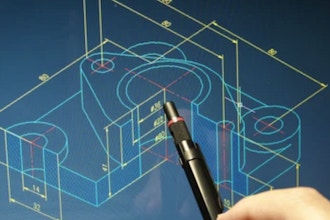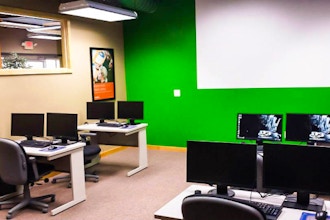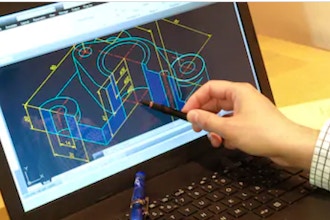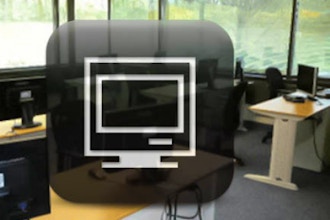Discover the Best AutoCAD Classes in Boston
Professionals in many industries use AutoCAD, a software program that helps them create 2D and 3D design models. “CAD” is short for “computer-assisted design.” AutoCAD was first created in 1982. While some professionals use other CAD programs, like ActCAD, SketchUp, and MicroStation, AutoCAD continues to be industry-standard for design modeling software. Its user base includes planning, design, and construction professionals.
Most people associate AutoCAD’s modeling software with drafters or architects laying out a building plan. AutoCAD is also a vital tool in other industries and professions, however. For example, an engineer could use AutoCAD to model their designs and check them for errors. Urban planners also use AutoCAD, which makes it easier for them to draw out their plans and create topographic maps of the area they’re working with. The program is also becoming more and more popular with design professionals, including game designers, animators, and graphic designers.
One might ask why a program that has been around since 1982 is still industry-standard. In fact, AutoCAD’s long history of assisting professionals with 2D and 3D modeling contributes to the solidity of its reputation. It also provides those creating models with a strong suite of tools that allow them to build, develop, test, and animate their designs. The AutoCAD interface is user-friendly. It is also easy to get AutoCAD to integrate with other software if you want to export a design to create a blueprint, or even 3D print a scale model. AutoCAD’s development team has been consistent in updating the program to address evolving use cases over time. Recent updates have included using artificial intelligence and augmented reality to enhance the design and modeling process.
Best AutoCAD Classes & Schools in Boston
#1: Technical Institute of America—AutoCAD Level 1
In the Technical Institute of America’s AutoCAD Level 1 course, students begin getting acquainted with AutoCAD by exploring its interface. They learn to work with the panels, tabs, and ribbons in the program. They discover how to use the drawing tools that the program has to offer. Then they work with the applications browser and explore the help features of the program. Next, they use the drawing tools to make lines, circles, arcs, rectangles, and polylines. They also discover how they can use object snaps to improve the quality of their drawings.
Students move on to copying commands. They learn how to move and copy objects, then explore the more sophisticated copying functions such as the array, mirror, and offset commands. After this, they discover how to modify objects in their drawings, using commands such as stretch, extend, trim, fillet, chamfer, and scale. Next, they annotate their drawings using dimensions and the different text functions of the program. And they learn how to apply hatch commands to the objects they’ve created and modified.
The course covers how to create and manage layers, then how to manipulate their states using commands like isolate, freeze, off, and lock. Students learn how they can create multiple layouts to plot, set scales, and use viewports to access different scale views of the drawings. Their studies wrap up with an introduction to paperspace and modelspace.
Key Information
This one-day workshop is full-time. It is a beginner course with no prerequisites. Tuition for this course is $749.
More Details
Students say the “fantastic” teachers at Technical Institute of America make this course “entertaining” and “enjoyable.” The instruction was “clear,” “straightforward,” and “thorough.”
#2: Noble Desktop—Introduction to AutoCAD
Noble Desktop’s Introduction to AutoCAD course begins with an introduction to the AutoCAD interface. Students learn the basic commands for drawing and editing. They first create a file in AutoCAD and make a simple drawing, then learn how to edit it, making the most of the precision offered by the drawing functions in this program. They also learn how to examine their drawing by zooming and panning across it. The course also covers several keyboard shortcuts that will make it possible for students to use AutoCAD with maximum efficiency.
Next, students move on to focus on the various basic drawing commands, such as lines, circles, and rectangles. Once they have created simple drawings, students use the modify tools to lay them out. Then they bring in the object snap tracking tools, which allow them to get a projection of what their model would look like from above. The course then explores the precision drawing tools that AutoCAD provides to users. Students learn more about object tracking and snap along with polar tracking, specifically how these functions can help them maximize the precision of their models. The course wraps up with instruction in how to use AutoCAD’s editing tools to modify their drawing. Tools covered include the rotate, copy, mirror, move, and scale functions.
Key Information
This three-day program is part-time at three hours a day. There are no prerequisites for this beginner-level class. Tuition for the course costs $325.
More Details
Noble Desktop is known for its high-quality instructors and the personal attention that its small class sizes make possible. Students receive a proprietary workbook to accompany their studies. Noble allows graduates to retake any class for free within one year of completion.
Students say the “top notch” instructors at Noble have a “very effective” approach to teaching. They “highly recommend” this course, which they found an “extremely valuable” use of their time.
#3: D3 Technologies—AutoCAD Electrical Essentials
The AutoCAD Electrical Essentials course from D3 Technologies provides students whose work involves electrical systems with an overview of AutoCAD as a professional tool in their industries. It starts off with a hands-on, interactive tour of the program’s electrical utility functions. Students discover how to build production drawings for electrical controls, then how to manage them within the program. Designed for this specific application of AutoCAD, the course’s focus is how professionals can use this tool to build specialized models–for example, intelligent ladder diagrams. Students also learn how to make the most of the program’s built-in artificial intelligence functions. They go through exercises that represent real-world possibilities for design scenarios they might be called upon to execute at work. In building their models, students are taught to follow the electrical standards provided by the National Fire Protection Association.
Key Information
This full-time course takes place over two days. It has no prerequisites. The cost is $1230.
More Details
Students praise D3 Technologies’ “cutting edge” instruction and the “vast technical knowledge” of its teachers.
#4: Kelar Pacific—AutoCAD Fundamentals
Students taking Kelar Pacific’s AutoCAD Fundamentals course begin by learning to create a simple 2D drawing in the program. At the start, they explore the user interface and workspace that will make it possible for them to build their intended model. They go on to explore the basic drawing and editing tools that the program offers. They also discover how panning and zooming in AutoCAD can give them different views of a design in process. To organize objects within their drawings, students learn how to use the layer function. Next, the course covers how to insert reusable symbols, called “blocks” in AutoCAD, into a drawing so as to make the modeling process as efficient as possible
Students move on to discovering how they can create a layout to prepare for plotting. And they learn how to add dimensions, text, and hatching to an image. To gain more control over the objects their model contains, students design constraining parameters within the program. After that, they return to blocks, exploring how to create them in different versions such as dynamic, local, and global. The course also touches on how to create standard templates, styles, and layers that students can use across the different drawings they create. It wraps up with an exploration of various options students can use to plot and publish their drawings once they have completed them.
Key Information
This is a five-hour workshop that takes place on one day. There are no prerequisites for this beginner course. Tuition costs $795.
More Details
This course, according to its graduates, is “very enjoyable” and “super informative.” They found the instructors at Kelar Pacific “knowledgeable” and “patient.
#5: NYC Career Centers—AutoCAD in a Day
The AutoCAD in a Day course at NYC Career Centers is designed to teach the basics of AutoCAD. Students learn how they can use the program for technical drawing and drafting. They discover the basic drawing and editing techniques that will allow them to create models of real architectural or mechanical objects. There is also a three-day course of which this one is the first day. The second two days cover properties, layers, plotting, text, and measurements, among other important principles in AutoCAD.
Key Information
This is a one-day, full-time course at seven hours. It does not have any prerequisites. The price is $325.
More Details
Students say the “amazing” instructors at NYC Career Centers are “super knowledgeable and kind.” The course was well-designed, “to the point,” and “highly interactive.”
#6: ONLC Training Centers—AutoCAD for Novice Users
The AutoCAD for Novice Users course from ONLC Training Centers allows students to explore the interface in AutoCAD. They start by creating a simple image in two dimensions, then developing it over time with more and more advanced tools in the program. As they progress through the course, students do three hands-on projects, covering the mechanical, architectural, and schematic applications of AutoCAD.
The course starts with an exploration of the interface. Students learn about the cartesian workspace it offers and the various commands they can use. Once they’ve created a new file in AutoCAD, they discover the application’s basic drawing and editing tools. These include how to draw lines, rectangles, and circles using a vertical and horizontal axis. They also discover how they can undo and redo actions, as well as how to erase any object they have created. They then create a drawing using the basic shapes in the program, which they can modify and manipulate as they learn.
The course’s image manipulation unit begins with how to use object snaps. Students learn many relevant functions, such as how to override object snaps, make use of running ones, employ polar tracking at angles, and do object snap tracking. They discover how to use the grid and snap functions for drawing. Next, the course covers several editing functions of the program, including scaling, moving, rotating, and mirroring objects.
Once these projects are done, the course moves on to more advanced AutoCAD tools such as the use of layers for organizing a drawing. Students learn the creation and manipulation of advanced types of objects. They also work with measurements and properties of objects in order to make their models more precise. This involves modifications of objects such as extending, trimming, stretching, or offsetting existing objects in the drawing.
Next, students discover how they can create a layout in the program so as to prepare their model for printing. They insert text, annotations, dimensions, and tables to label their model for easier comprehension and sharing. Once it wraps up advanced 2D image manipulation, the course touches briefly on 3D functions of the program.
Key Information
This four-day course is full-time. There are no prerequisites for this beginner course. The tuition cost is $2745, but it is possible to get a discounted rate, $2495, if one registers early.
More Details
According to students, the “very knowledgeable” instructors at ONLC provide “a wealth of information.” One declared that instruction at ONLC was “the best I’ve experienced.”
Boston Industries That Use AutoCAD
According to the city government’s website, the top industries in Boston include healthcare, scientific and technical services, and government. Workers in the healthcare industry could use AutoCAD to model new health technologies and assistive devices as they design them. CAD technologies can also be used to personalize surgical plans and model drug designs, along with many other uses. Similarly, the program can help tech professionals come up with designs for new devices and visualize them in multiple dimensions. Government workers include 3D design professionals like architects and urban planners. These designers can use AutoCAD to create construction drawings and model the layout of streets or public transportation. Civil and mechanical engineers working for the government can also use AutoCAD for design purposes.
AutoCAD Jobs & Salaries in Boston
AutoCAD can qualify you for a range of jobs in Boston, which vary in their pay levels depending on job and industry. A hardware design engineer, who could use AutoCAD for modeling in Boston’s healthcare or tech industries, makes an average salary of $101,000 yearly in Boston. Architects based in the area average $105,000 yearly, while urban planners make an annual salary of about $78,000. The average yearly pay for a civil engineer is $79,000, while mechanical engineers make $96,000.














.jpg?auto=format%2Cenhance%2Ccompress&crop=entropy&fit=crop&h=220&ixlib=php-1.2.1&q=90&w=330)












